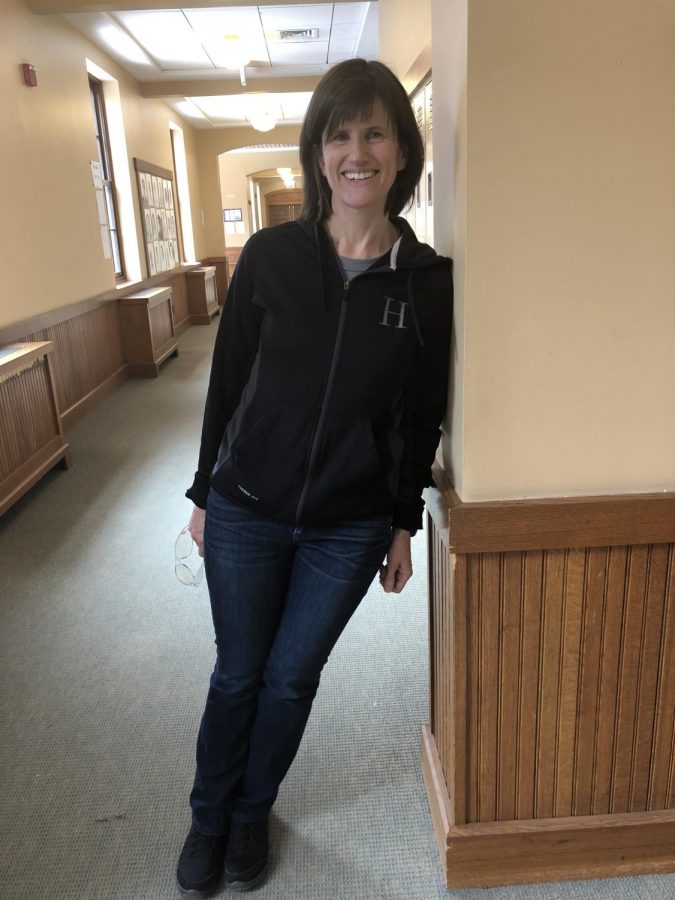Ms. Judkins advocates for local activism
Head Librarian highlights work for League of Women Voters
March 8, 2018
Head Librarian Brianna Judkins, chatting with the Dial from her office in the Sternberg Library, candidly explained her reasoning for becoming a political activist.
The election of 2016 galvanized her to action: “When Trump became the Republican candidate, I said, ‘wait I can’t just sit and do nothing.’” Judkins is one of millions of newly energized citizens who have joined sweeping grassroots political movements, from #MeToo and the recent Women’s March to the enormous online support for protecting net neutrality.
Motivated by a concern that democracy had stopped working, Ms Judkins leapt at the opportunity to make her own voice heard, and to be a part of the effort to fix the problem.
At her local farmers market, the League of Women Voters, a nonpartisan group dedicated to the preservation of democracy, was registering, and she asked them how to join their group. In her own words: “Next thing I knew I was on the board.”
Nonetheless, Ms. Judkins’ history of political activism stretches farther back.
As she traced the roots of her activism, she paused for a moment, remembering early but profound memories of her parents and Wisconsin.
Both were elected officials: her father an alderman on the city council and her mother president of the school board, both running for office and well-versed in Wisconsin politics.
Despite being liberal, her parents actively campaigned for a Republican politician whose views they supported, motivated by a sense of duty to express their beliefs. Partisan politics was not their interest; real issues, policies, and candidates were their concern, and they became Ms Judkins’.
The values her parents held and their activism no doubt influenced her decision to join “the League” as she calls it, of which her mother was a part.
The increasing polarization of the political sphere, where parties mattered more than the values they embodied motivated her seemingly spontaneous decision to take a stand.
Making a difference, however, takes more than just nominally joining an activist group.
Ms Judkins had to find her place in the organization, a way to make her time worthwhile.
In the age of Information, some of what once happened at sit-ins and public rallies now happens on the internet and through Twitter, and new opportunities offered by online communication has allowed Ms. Judkins to do her part and make her voice heard.
On the board of the League of Women Voters of the Rivertowns, she oversees the online and social media operations of the group.
Online outreach has not been a forte of her local branch of the League, now over a century old and many of its members older than the audience of young activists they are trying to reach. If Ms. Judkins wanted to keep the good work of the League going, she was going to have to keep up with how people get involved.
Managing the online side of the League is more than just sending out 3AM tweets about election legitimacy.
On top of publicizing the broad range of topics covered by the League, from conducting research on specific topics and publishing them along with official stances, to moderating candidate debates and attending forums on specific laws like the recent proposal for statewide single payer healthcare, Ms. Judkins has also redesigned and streamlined the League’s website, all in an effort to get information out to and increase involvement with a wider audience.
Though it may not carry the same excitement as chanting and holding picket signs, Ms. Judkins’ work is essential to the process of grassroots political activism.
She explained, “Even though I’m not out there, if I wasn’t doing what I’m doing people wouldn’t know about it.”
Ms. Judkins recently managed publicizing forums for proposals for single payer healthcare across New York, her efforts key to increasing awareness and engagement.
While offering her strengths to the group to best help them, she has also developed in areas she hadn’t previously learned.
Leaning back in her chair, she said with genuine reflection, “These women and men [on the board] are so intelligent and know so much about local and state politics.”
Through her experience joining the League of Women Voters, Ms. Judkins found that the most powerful impact her newfound voice could have was reaching out, and encouraging others to want to make themselves heard.
The first step is staying informed, be it following a local politician on Twitter, or following a local nonpartisan group like a local branch of the League of Women Voters. After this, the opportunities to get involved, even for high schoolers, are many.
Organizations such as Ms Judkins’ own LOWV of the Rivertowns sponsors students each year to visit Albany, shadow a state senator, meet other youth activists, and learn more about their local political system.
She detailed the program with a barely withheld excitement. If she could become a board member of her local League with all the responsibilities of a working adult and parent in just two years, she has high hopes for what would become of a teen willing to make the same jump years earlier.

